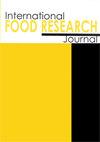Modelling post-frying oil absorption, water loss, and cooling of potato cylinders
IF 1
4区 农林科学
Q4 FOOD SCIENCE & TECHNOLOGY
引用次数: 0
Abstract
A simultaneous heat and mass transfer model based on global coefficients was proposed to describe the oil absorption, water loss, and temperature changes occurring during the post-frying period of potato cylinders. The model was solved in Matlab® and simultaneously fitted to post-frying kinetics from literature, describing the surface and penetrated surface oil contents, as well as the surface and centre temperatures of potato cylinders at six holding temperatures (25, 100, 120, 140, 160, and 180°C). Besides, simple algorithms were developed to evaluate the oil layer thickness and the minimum oil penetration distance, obtained by assuming the potato cylinder was split into a dry zone, where the oil was absorbed, and a moist zone free from oil. The model achieved a good reproduction of fitted responses with average deviations ranging from 1.9 to 11.7% for all post-frying holding temperatures. Estimated distribution coefficients evidenced higher oil absorption at low holding temperatures, increasing from 0.66 kg surface oil/kg absorbed oil at 25°C to 2.60 kg surface oil/kg absorbed oil at 180°C, while no temperature influence on mass transfer coefficient was found under the explored experimental conditions (p > 0.05). The estimated minimum oil penetration distance (thickness of the dry zone region) after the post-frying stage (229 to 506 µm) showed a good agreement with crust thickness values from literature.模拟油炸后的油吸收,水分损失,和冷却的土豆圆筒
提出了一种基于全局系数的同时传热传质模型,用于描述马铃薯圆筒油炸后的吸油、失水和温度变化过程。该模型在Matlab®中求解,并同时拟合文献中的油炸后动力学,描述了马铃薯圆柱体在六种保温温度(25、100、120、140、160和180°C)下的表面和渗透表面油含量,以及表面和中心温度。此外,开发了简单的算法来评估油层厚度和最小油渗透距离,假设马铃薯圆柱体分为干燥区,其中油被吸收,潮湿区,无油。该模型对所有油炸后保温温度的拟合响应进行了良好的再现,平均偏差范围为1.9 ~ 11.7%。估计的分布系数表明,低温下吸油率较高,从25°C时的0.66 kg表面油/kg吸收油增加到180°C时的2.60 kg表面油/kg吸收油,而在探索的实验条件下,没有发现温度对传质系数的影响(p >0.05)。油炸后的最小油渗透距离(干区厚度)(229 ~ 506µm)与文献中地壳厚度值吻合较好。
本文章由计算机程序翻译,如有差异,请以英文原文为准。
求助全文
约1分钟内获得全文
求助全文
来源期刊

international food research journal
Agricultural and Biological Sciences-Food Science
CiteScore
1.40
自引率
0.00%
发文量
75
期刊介绍:
The International Food Research Journal (IFRJ) publishes papers in English, six (6) issues a year with the coverage of:
Food Science and Technology
Nutrition and Dietetics
Agriculture, multidisciplinary
Chemistry, multidisciplinary
The scope of the Journal includes:
Food Science, Food Technology and Food Biotechnology
Product Development and Sensory Evaluation
Food Habits, Nutrition, and Health
Food Safety and Quality
Food Chemistry, Food Microbiology, Food Analysis and Testing
Food Engineering
Food Packaging
Food Waste Management
Food Entrepreneur
Food Regulatory
Post-Harvest Food Management
Food Supply Chain Management
Halal Food and Management
 求助内容:
求助内容: 应助结果提醒方式:
应助结果提醒方式:


